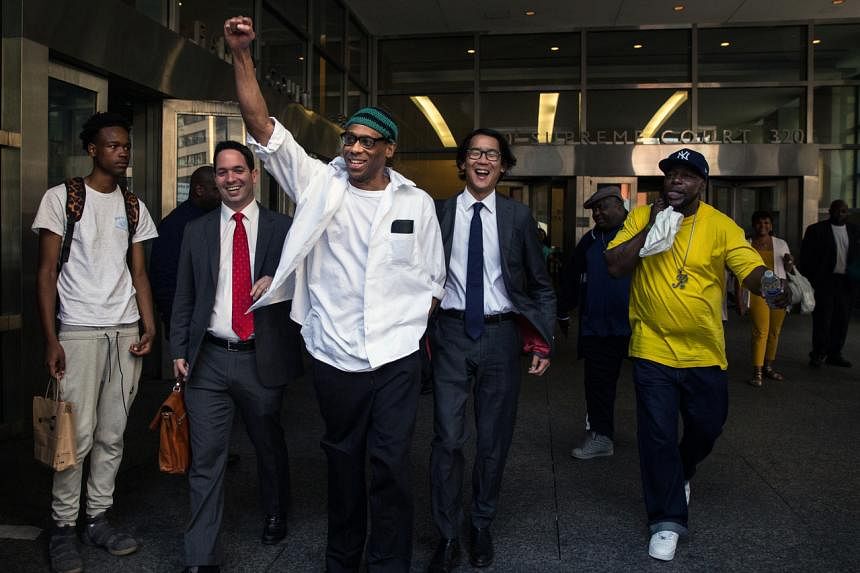NEW YORK (NYTIMES) - Shawn Williams was only 19 when his life was upended.
He was accused of killing a man in Brooklyn in 1993, and, although no forensic evidence ever connected him to the killing, one woman's testimony that she spotted him at the scene with a gun landed him in prison for 24 years.
The teenager steadfastly maintained his innocence as he watched the milestones of early adulthood pass behind bars. Then, several years ago, the supposed witness recanted, saying that Louis Scarcella, a prolific and once-renowned homicide detective, coerced her into naming Williams. The prisoner was eventually released.
Now, city officials will pay Williams US$10.5 million (S$14.5 million) to settle a federal civil rights suit against the former detective and two other officers. The award is believed to be the largest so far in the series of wrongful conviction cases spurred by the conduct of Scarcella, whose record has collapsed as similar accusations have mounted.
"No amount of money can give me back the years they took from me," Williams, 47, said in a statement on Wednesday (May 4). "But I am going to keep rebuilding my life and looking ahead to a brighter future."
The case exemplifies police abuses that have garnered attention in recent years as the city and the nation rethink the ethics and practices of law enforcement.
Williams' conviction was thrown out in 2018 amid a series of other exonerations in New York and across the country - many involving police or prosecutorial misconduct in cases from the 1980s and 1990s, an era marked by the crack epidemic in which murders and drug violence soared.
As officials once again face public and political pressure to ease gun violence and anxieties over crime, some residents fear that dubious practices could resurge - and that misconduct may grow increasingly common.
Scarcella, a flashy and swaggering detective, handled some of Brooklyn's most notorious crimes in a unit that handled more than 500 homicides a year. His reputation began to collapse after one of his most celebrated investigations - into the killing of a Hasidic rabbi in Williamsburg - unravelled in 2013 and defence attorneys accused him of framing a suspect.
Since then, more than a dozen convictions he helped secure have been thrown out, and the city has paid tens of millions of dollars to settle lawsuits over his cases with several still unresolved.
Scarcella, who retired from the Police Department in 1999, has repeatedly said he stands by his work and did nothing wrong. Richard Signorelli, an attorney who represents him, said on Wednesday that Scarcella "categorically denies" all accusations of misconduct in Williams' case and stressed that the settlement did not represent an admission.
"He did nothing wrong," Signorelli said, noting that a claim against the state that Williams filed under the Unjust Conviction and Imprisonment Act was dismissed this year. A judge ruled he did not meet "his heavy burden of proving his actual innocence".
After the July 1993 shooting, Scarcella and his partner, Stephen Chmil, visited the supposed witness in her home across the street from the scene, displaying Williams' picture in an array. She did not initially identify him but, during a later visit, told the detectives she had seen him with a gun at his waist on the night of the killing, attorneys for Williams wrote in their complaint against the city.
The detectives told the witness "they might turn to her son as a suspect if she did not provide them with one", the court filing said.
The attorneys also wrote that the witness later left New York for Georgia "in part because she did not want to continue to participate" in a wrongful prosecution. But prosecutors obtained an order from a judge requiring her testimony. She was arrested and taken to New York "against her will" to testify, which Williams' trial attorneys had not known, the complaint said.
Williams has said that he was in southern Pennsylvania at the time of the killing, and records place him there in the days before and after, the filing said.
Still, he was convicted and sentenced to 25 years to life.
"Shawn has been through the fire for nearly 30 years," said David Shanies, a civil rights attorney who represented Williams with Samuel Hershey, another New York-based attorney. "It's satisfying to see him come out the other side with his name cleared and some reparation for his ordeal."
After Scarcella's Williamsburg case fell apart, Brooklyn prosecutors launched an expansive probe into his record. More than 70 cases have now fallen under scrutiny, with several inquiries continuing.
The Williams settlement adds to the city's long line of payouts in recent years over the detective's work. Robert Hill, falsely accused of shooting a man in Crown Heights in 1987, received US$7.15 million in 2015. His half brother, Alvena Jennette, was also wrongly convicted - accused of killing a man for money in a separate case - and awarded US$6 million, a similar amount to agreements in other suits.
In those cases and several others, prosecutors found that Scarcella had repeatedly relied on the same woman as a witness, even as her testimony often conflicted with others'.
Chmil has gained less notoriety than his partner and his cases were not separately reviewed by the Brooklyn district attorney's office. But he was named in Williams' suit and has been accused of similar dishonest behaviour across his casework.
He has denied wrongdoing, and Nicholas Paolucci, a spokesperson for the city's Law Department, which has represented him, said that "settling this civil case was in the best interest of all parties."

